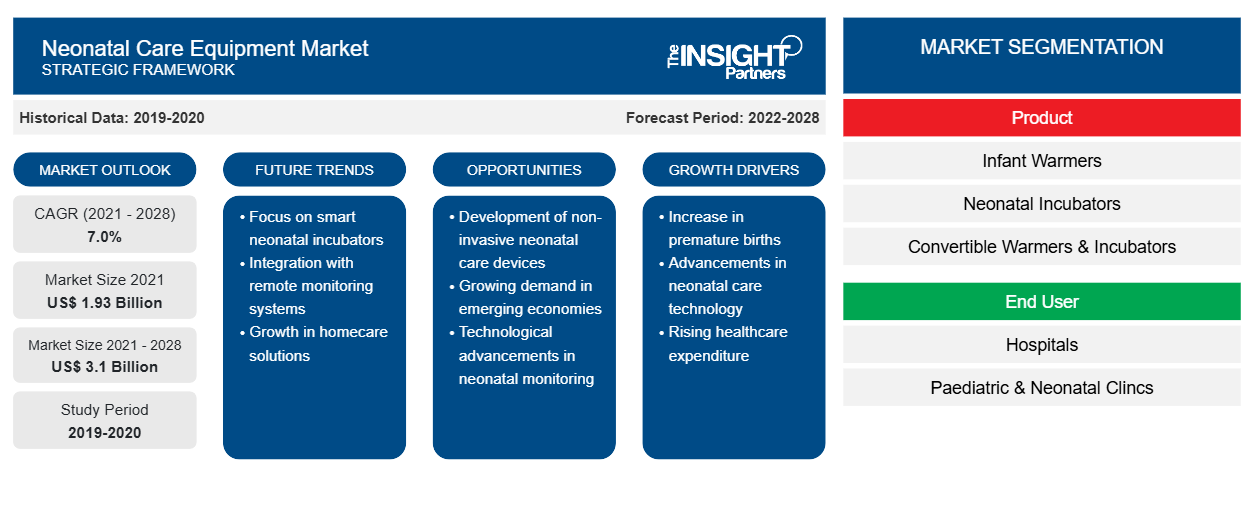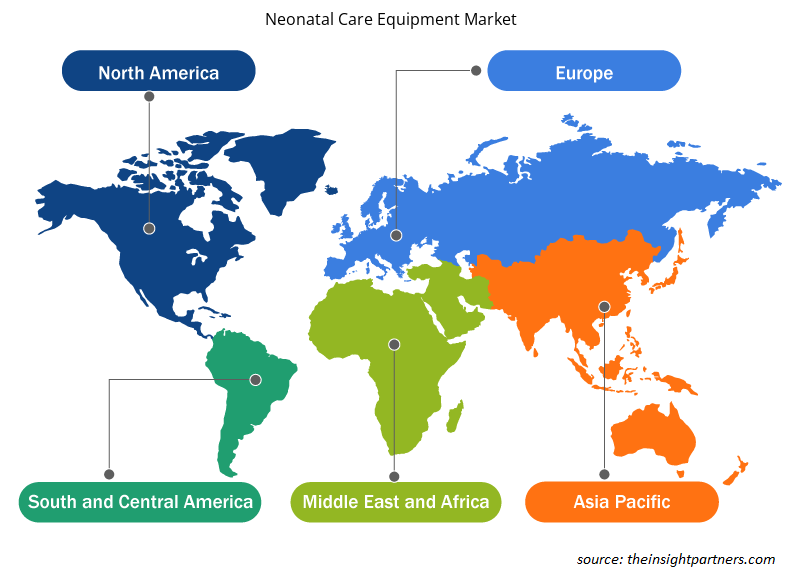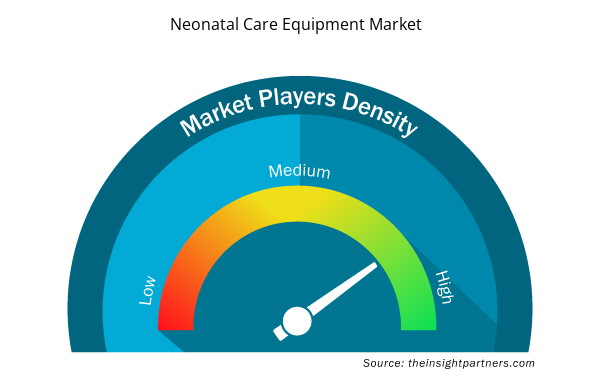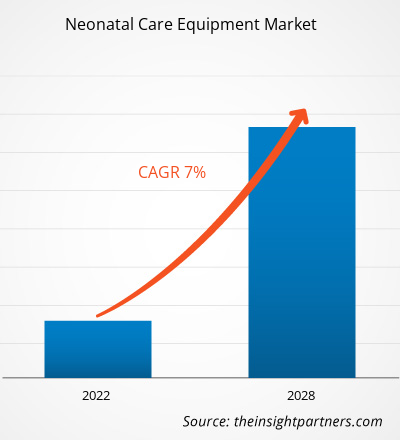The neonatal care equipment market is projected to reach US$ 3,103.81 million by 2028 from US$ 1,934.24 million in 2021. It is expected to register a CAGR of 7.0% from 2022 to 2028.
Neonatal care equipment is used to care for small and sick neonates to keep them warm, track their growth, treat jaundice, and provide oxygen or respiratory support. The infants are taken care of by using various devices such as electric warmers, neonatal ventilators, continuous positive airway pressure devices, blood pressure monitors, cardiac monitors, pulse oximeters, capnographs, integrated monitoring devices, and other devices.
The report offers insights and in-depth analysis of the global neonatal care equipment market, emphasizing various parameters, such as market trends, technological advancements, and market dynamics. It also provides the competitive landscape analysis of leading market players and the impact of the COVID-19 pandemic on the market across all major regions.
Customize This Report To Suit Your Requirement
You will get customization on any report - free of charge - including parts of this report, or country-level analysis, Excel Data pack, as well as avail great offers and discounts for start-ups & universities
Neonatal Care Equipment Market: Strategic Insights

- Get Top Key Market Trends of this report.This FREE sample will include data analysis, ranging from market trends to estimates and forecasts.
Customize This Report To Suit Your Requirement
You will get customization on any report - free of charge - including parts of this report, or country-level analysis, Excel Data pack, as well as avail great offers and discounts for start-ups & universities
Neonatal Care Equipment Market: Strategic Insights

- Get Top Key Market Trends of this report.This FREE sample will include data analysis, ranging from market trends to estimates and forecasts.
The cost of overall healthcare is surging significantly in North America. The US health system incurred a direct cost of US$ 5.3 billion in 2020. The healthcare system contributed US$ 60 billion in addition to the overall annual costs of the country in 2020. Over 40% of the population in North America canceled their appointments in 2020, and 13% reported that they needed care but did not schedule or receive care. The COVID-19 pandemic altered economic conditions and social behaviors in North American countries. Containment measures enacted by governments to mitigate the spread of disease changed the US healthcare service delivery pattern. According to the Department of Emergency Medicine, in many cities across the country, emergency department (ED) visits decreased by ~40% in 2020. Moreover, outpatient appointments and elective treatments were postponed or replaced by telemedicine practices.
In November 2021, Pfizer Inc. announced the investigational COVID-19 oral antiviral candidate, PAXLOVID. Based on an interim analysis of the Phase 2/3 Evaluation of Protease Inhibition for COVID-19 in High-Risk Patients (EPIC-HR), a randomized, double-blind study of non-hospitalized adult COVID-19 patients who were at a high risk of progressing to severe illness, the PAXLOVID vaccine reportedly reduced hospitalization and death. There were supply constraints related to vaccine production in the initial months of 2021. However, setting up new plants and promoting technological shifts are the strategies that support the production of booster doses in the US and Canada, along with their administration plans.
Premature infants and term infants with medical disorders requiring prolonged hospitalization are prone to hospital-acquired (nosocomial) infection; thus, the adoption of neonatal care equipment in baby care facilities was adversely affected in the wake of the COVID-19 outbreak. Therefore, the financial crisis among the masses in North America is projected to hamper the growth of the neonatal care equipment market
Based on region, the global neonatal care equipment market is segmented into North America, Europe, Asia Pacific, the Middle East and Africa, and South and Central America.
Market Insights
Growing Number of Premature and Low Weight Births Drives Global Neonatal Care Equipment Market
The increase in preterm and low-weight births is one of the major factors driving the growth of the fetal and neonatal care devices market. With the increasing number of births, many complications are associated with prematurity, resulting in neonatal deaths. Prematurity is defined as a live birth before 37 weeks of gestation, with a birth weight of less than 2500 g being considered a low weight birth. According to a study published in the July 2020 International Journal of Gynecology & Obstetrics, titled "Global Burden of Preterm Birth," around 15 million babies are born prematurely worldwide, resulting in a global preterm birth rate of approximately 11%. Additionally, in the US, according to the Centers for Disease Control and Prevention, a November 2021 updated article titled "Preterm Birth" reported that one in 10 children born in 2020 was born prematurely. In addition, the incidence of diseases in newborns also increased. These factors increased the neonatal care equipment market demand for fetal and neonatal care equipment.
Preterm birth remains a significant public health problem, contributing to 75% of worldwide neonatal mortality. Low birth weight (LBW) is an important but imperfect surrogate for preterm birth when the accurate determination of gestational age is impossible. While there is overlap between preterm births and LBW newborns, those who are both preterm and LBW are at the highest risk for adverse neonatal outcomes. The World Health Organization (WHO) estimates that over 15 million infants are born prematurely yearly, and around 1 million die from premature problems. According to the World Health Organization, more than 60% of preterm births occur in South Asia and Africa. The preterm birth rate in low-income countries was around 12%, compared to 9% in higher-income countries. Approximately 3,519,100 preterm births were recorded in India in 2018. The increasing prevalence of hypothermia in preterm infants is a significant public health concern. The World Health Organization has reported it as a leading cause of neonatal mortality and morbidity. Common causes of premature birth are infections, chronic diseases such as high blood pressure and diabetes, and multiple pregnancies; however, often, no cause is identified. Therefore, the increasing number of preterm births and increased survival concerns have fueled the demand for neonatal care equipment to manage the complications associated with preterm birth.
Product-Based Insights
Based on product, the global neonatal care equipment market is segmented infant warmers, neonatal incubators, convertible warmers & incubators, neonatal phototherapy equipment, respiratory care devices, neonatal monitoring devices, neonatal diagnostic imaging devices, and other care equipments. In 2021, the neonatal respiratory care devices segment accounted for the largest neonatal care equipment market share. The market position of this segment is due to the rising cases of respiratory distress syndrome in newborns.
Neonatal Care Equipment Market Regional Insights
Neonatal Care Equipment Market Regional Insights
The regional trends and factors influencing the Neonatal Care Equipment Market throughout the forecast period have been thoroughly explained by the analysts at Insight Partners. This section also discusses Neonatal Care Equipment Market segments and geography across North America, Europe, Asia Pacific, Middle East and Africa, and South and Central America.

- Get the Regional Specific Data for Neonatal Care Equipment Market
Neonatal Care Equipment Market Report Scope
| Report Attribute | Details |
|---|---|
| Market size in 2021 | US$ 1.93 Billion |
| Market Size by 2028 | US$ 3.1 Billion |
| Global CAGR (2021 - 2028) | 7.0% |
| Historical Data | 2019-2020 |
| Forecast period | 2022-2028 |
| Segments Covered |
By Product
|
| Regions and Countries Covered | North America
|
| Market leaders and key company profiles |
Neonatal Care Equipment Market Players Density: Understanding Its Impact on Business Dynamics
The Neonatal Care Equipment Market market is growing rapidly, driven by increasing end-user demand due to factors such as evolving consumer preferences, technological advancements, and greater awareness of the product's benefits. As demand rises, businesses are expanding their offerings, innovating to meet consumer needs, and capitalizing on emerging trends, which further fuels market growth.
Market players density refers to the distribution of firms or companies operating within a particular market or industry. It indicates how many competitors (market players) are present in a given market space relative to its size or total market value.
Major Companies operating in the Neonatal Care Equipment Market are:
- GE Healthcare
- Koninklijke Philips N.V.
- Medtronic
- Dragerwerk AG & Co. KGaA
- Nihon Kohden Corporation
Disclaimer: The companies listed above are not ranked in any particular order.

- Get the Neonatal Care Equipment Market top key players overview
End User-Based Insights
Based on the end user, the global neonatal care equipment market is categorized into hospitals, paediatric and neonatal clinics, and nursing homes. The hospitals segment hold the largest market share in 2021.
Players in the global neonatal care equipment market adopt organic strategies, such as product launch and expansion, to increase their footprint and product portfolio worldwide.
By Geography, North America is further segmented into the US, Canada, and Mexico. Europe is bifurcated into France, Germany, Italy, the UK, Spain, and the Rest of Europe. APAC is divided into China, India, South Korea, Japan, Australia, and the Rest of APAC. The Middle East and Africa is segmented into South Africa, Saudi Arabia, UAE, and the Rest of the MEA. South and Central America is segmented into Brazil, Argentina, and the Rest of SAM.
Some of the major players contributing in the neonatal care equipment market are GE Healthcare, Koninklijke Philips N.V., Medtronic, Dragerwerk AG & Co. KGaA, Nihon Kohden Corporation, Natus Medical Incorporated, Fisher & Paykel Healthcare Limited, Massimo, BD, and Novos.
- Historical Analysis (2 Years), Base Year, Forecast (7 Years) with CAGR
- PEST and SWOT Analysis
- Market Size Value / Volume - Global, Regional, Country
- Industry and Competitive Landscape
- Excel Dataset



Report Coverage
Revenue forecast, Company Analysis, Industry landscape, Growth factors, and Trends

Segment Covered
Product, End User, and Geography

Regional Scope
North America, Europe, Asia Pacific, Middle East & Africa, South & Central America

Country Scope
Argentina, Australia, Brazil, Canada, China, France, Germany, India, Italy, Japan, Mexico, Saudi Arabia, South Africa, South Korea, Spain, United Arab Emirates, United Kingdom, United States
Frequently Asked Questions
The global neonatal care equipment market based on regions is segmented into North America, Europe, Asia Pacific, Middle East & Africa, and South & Central America. In 2021, the North American area held the largest market share. However, the Asia Pacific region is estimated to grow at the fastest CAGR of 7.6% during the forecast period.
The global neonatal care equipment market based on products is segmented into infant warmers, neonatal diagnostic imaging devices, neonatal respiratory care devices, neonatal monitoring devices, neonatal incubators, neonatal phototherapy equipment, and others. In 2021, the neonatal respiratory care devices segment held the largest share of the market. Moreover, the same segment of the neonatal care equipment market is expected to register the highest CAGR of 7.5% from 2022 to 2028.
Decreasing birth rates and high prices of products is expected to restrict the neonatal care equipment market growth during the forecast period.
The neonatal care equipment market majorly consists of the players, such as GE Healthcare; Koninklijke Philips N.V.; Medtronic; Dragerwerk AG & Co. KGaA; Nihon Kohden Corporation; Natus Medical Incorporated; Fisher & Paykel Healthcare Limited.; Masimo; BD; Novos,among others.
Neonatal care equipment is a complex medical machine and device for the unique needs of tiny babies. Neonatal intensive care is a unit of the hospital that includes a specialized team of medical professionals and advanced technology devices to provide routine care for premature or sick babies.
The factors driving the growth of the neonatal care equipment market are the growing number of premature and low-weight births and the increasing number of NICU admission.
Trends and growth analysis reports related to Life Sciences : READ MORE..
The List of Companies - Neonatal Care Equipment Market
- GE Healthcare
- Koninklijke Philips N.V.
- Medtronic
- Dragerwerk AG & Co. KGaA
- Nihon Kohden Corporation
- Natus Medical Incorporated
- Fisher & Paykel Healthcare Limited.
- Masimo
- BD
- Novos

 Get Free Sample For
Get Free Sample For